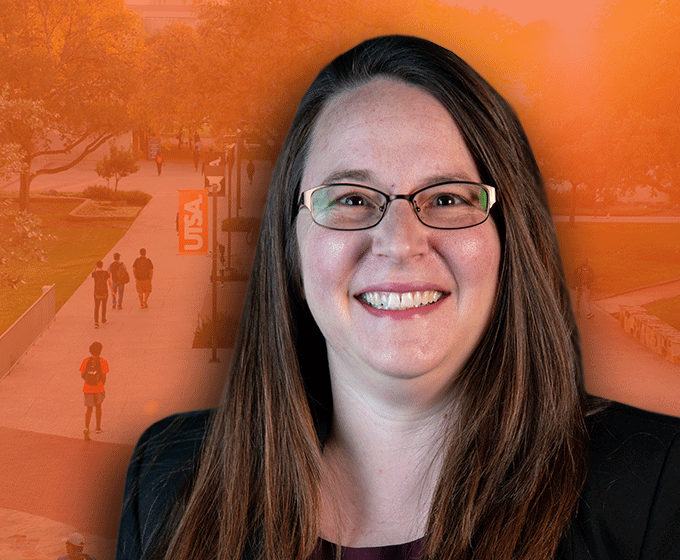
AUGUST 20, 2021 — Sarah Ullevig, associate professor of nutrition and dietetics in the UTSA College for Health, Community and Policy, is studying the impact of COVID-19, the science of nutrition and the ever-evolving knowledge of how food can affect our bodies.
Ullevig’s research interests include two broad areas of nutrition-focused research: nutrition in healthy aging and the relationship between nutrition, inflammation and oxidative stress in nutrition-related diseases. Her research involves studying health issues impacting older adults, including malnutrition, food security, nutritional adequacy, age-related muscle loss and dietary supplement use.
Oxidative research is the disturbance in the balance between the production of reactive oxygen species (free radicals) and antioxidant defenses. This type of stress discusses its relation to its possible role in the production of tissue damage in diabetes.
UTSA Today connected with Ullevig this week to learn more about her research and how people can manage stress through nutrition.
How has your research shifted in light of the pandemic?
I am interested in bridging the digital divide that was accentuated during the COVID-19 pandemic so that at-risk older adult populations can access nutrition and physical activity information and connect with others virtually.
How can nutrition help with stress management?
Connections have been made between certain nutrients that may help manage stress, but the strongest evidence supports eating a well-balanced, nutritious diet.
A well-balanced diet will have adequate fruits and vegetables, whole grains, lean protein sources, and low-fat dairy or dairy alternatives that can provide us with vitamins and minerals, and antioxidants to aid in stress management. It is important to acknowledge that stress can affect our food choices.
There is evidence to support that stress can increase the selection of less nutritious foods that are higher in fat and sugar that could potentially lead to weight gain.
How can be sure we are eating right during the pandemic?
It may be difficult to maintain healthy eating habits during stressful times, especially when stress is prolonged, like in this pandemic. Some tips that can help us all make good choices during stressful times:
How has your personal journey influenced your work?
I enjoyed working with older adults in my career as a registered dietitian in the community and continued working with this population as a researcher at UTSA.
I love learning about the molecular level of nutrition and how it affects the body. I also love to eat food and do not like when misinformation is spread about nutrition that makes people fearful to eat certain foods. I hope that I impart a respect for the science of nutrition, emphasize the importance of nutrition in healthy aging and never instill fear of eating foods to the future dietitians I teach at UTSA.
UTSA Today is produced by University Communications and Marketing, the official news source of The University of Texas at San Antonio. Send your feedback to news@utsa.edu. Keep up-to-date on UTSA news by visiting UTSA Today. Connect with UTSA online at Facebook, Twitter, Youtube and Instagram.
Move In To COLFA is strongly recommended for new students in COLFA. It gives you the chance to learn about the Student Success Center, campus resources and meet new friends!
Academic Classroom: Lecture Hall (MH 2.01.10,) McKinney Humanities BldgWe invite you to join us for Birds Up! Downtown, an exciting welcome back event designed to connect students with the different departments at the Downtown Campus. Students will have the opportunity to learn about some of the departments on campus, gain access to different resources, and collect some giveaways!
Bill Miller PlazaCome and celebrate this year's homecoming at the Downtown Campus with food, games, giveaways, music, and more. We look forward to seeing your Roadrunner Spirit!
Bill Miller PlazaThe University of Texas at San Antonio is dedicated to the advancement of knowledge through research and discovery, teaching and learning, community engagement and public service. As an institution of access and excellence, UTSA embraces multicultural traditions and serves as a center for intellectual and creative resources as well as a catalyst for socioeconomic development and the commercialization of intellectual property - for Texas, the nation and the world.
To be a premier public research university, providing access to educational excellence and preparing citizen leaders for the global environment.
We encourage an environment of dialogue and discovery, where integrity, excellence, respect, collaboration and innovation are fostered.